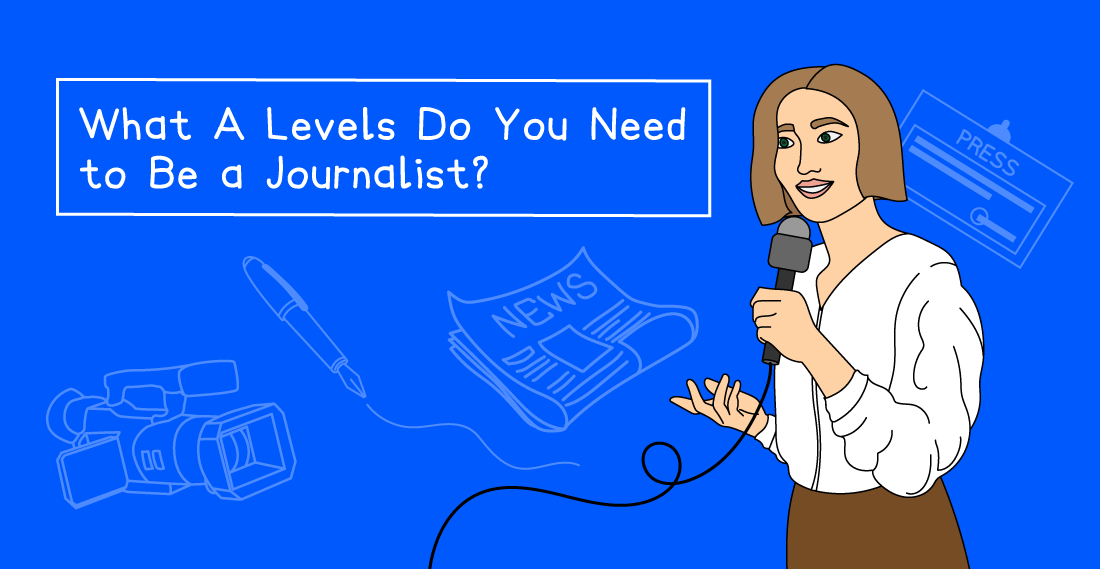What A Levels Do I Need to Be a Journalist?
Written by: Mary Olinger
Reviewed by: Liam Taft
Last updated

Contents
- 1. Essential A Levels for Journalists
- 2. Optional A Levels for Journalists
- 3. Best A Level Combinations for Journalists
- 4. Requirements for Top UK Universities
- 5. How to Choose Your A Level Subject for Journalism
- 6. Alternative Pathways Into Journalism
- 7. What Happens If I Don’t Choose These Subjects?
- 8. Improve Your Grades With Save My Exams
Being a journalist can be a fun career, especially for those who have a knack for telling stories, want to uncover the truth, and an insatiable curiosity about the world around them.
If you think it sounds exciting to be a news anchor, a magazine editor, or a foreign correspondent, journalism might be your calling in life.
The journalist career continues to grow in popularity, and about 75% of graduating students find a job within just a few months after they graduate. Let’s explore the A Levels you’ll need for a career in journalism.
Essential A Levels for Journalists
Universities don’t have a single set of A Level requirements for students pursuing Journalism degrees. With that being said, there are some subjects that are beneficial, such as English, Politics, Languages, and History.
These A Levels can build a strong foundation for the journalism student, yet there are others that can be used strategically to strengthen your university application. Here are the core A Level subjects to consider.
A Level English Language and Literature
For the aspiring journalist, A Level English Language and Literature is a cornerstone. It’s beneficial for helping hone skills in writing, textual analysis, and critical thinking.
Studying different literary works and developing your own writing style helps you learn to communicate persuasively and effectively.
This and other essay subjects help to enhance your understanding of narrative structures, which is critical for crafting your own compelling articles and news stories.
A Level History
Taking A Level History builds a strong background in research and analysis, which is imperative for the investigative journalist.
A solid grasp and understanding of historical context and events helps the journalists make sense out of current affairs. It also helps provide depth to reporting.
This core subject also covers how to critically evaluate evidence and its source, which is invaluable to ensure accuracy and credibility in your journalistic work.
A Level Sociology
A Level Sociology provides insights into cultural norms, behaviours, and social structures. Journalists need this to help them understand the diverse audiences and issues they will be reporting on.
Sociology helps develop critical thinking about social inequalities and trends, which enables the journalist to cover stories with sensitivity and depth in different social contexts.
A Level Politics
A Level Politics is invaluable for the aspiring political correspondent. This subject equips the student with an understanding of governmental structures, current affairs, and political theories. It is necessary for helping critically analyse political events and policies, which helps develop accurate and insightful reporting.
Optional A Levels for Journalists
A Level Economics
Understanding economics helps journalists understand financial markets and systems. This is useful when they are reporting on economy and business-related news. A Level Economics helps enhance analytic skills and interpreting data, so the journalist has a strong foundation when covering complex economic stories.
A Level Psychology
The journalist should be able to understand the reactions and motivations of their audience. A Level Psychology provides helpful insights into human behaviour and mental processes. Having this knowledge helps when building engaging stories and conducting interviews.
A Level Media Studies
Taking A Level Media Studies equips the student with a solid understanding of media theory, media production, and the role journalism plays in society. It can provide practical insights into the media industry, which includes best practices when creating content, critical analysis of media content, and knowledge about media regulations and ethics.
A Level Philosophy
A Level Philosophy helps sharpen ethical reasoning skills, logic, and critical thinking skills. These are all key assets for journalists. Philosophy encourages questions and exploration of complex issues from different perspectives, which is helpful for editorial writing to investigative reporting.
Best A Level Combinations for Journalists
There are a few great A Level combinations that can help build a strong foundation for those working towards a journalism degree. English and History are two base courses that the aspiring journalist should pursue. A Level English hones writing and communication skills, whereas History enhances research and understanding of various events.
Other A Levels that combine well with English and History include Politics, Media Studies, and Sociology. Politics adds depth and understanding to current affairs and governmental structures. Sociology looks at societal structures, cultural norms, and behaviours. And Media Structures introduces critical analysis of the media industry.
Requirements for Top UK Universities
Oxford Brookes University A Level Requirements
Students who desire to study journalism at Oxford Brookes University need at least three A Levels. Some courses have specific required subjects, such as English, History, Languages, Politics, and Media Studies.
Leeds Trinity University A Level Requirements
Students are required to have five qualifications for entry into undergraduate degree courses. At least two should be A Levels. One has to be English Language at a Grade C or above.
City University of London A Level Requirements
Acceptance into the degree program at City, University of London, requires three A Level courses with a grade ABB. The A Level profile cannot include General Studies, Critical Thinking, or Citizenship studies.
University of Sheffield A Level Requirements
The standard entry offer at the University of Sheffield requires an ABB A Level profile plus a fourth Level 3. The University doesn’t require any specific A Level courses, but suggests that students study areas that are of interest to them.
How to Choose Your A Level Subject for Journalism
University Requirements
While most universities in the UK do not require specific A Level courses for entry, make sure to check with the school of your choice. This way, you are less likely to miss an A Level course that is required by a specific course of study.
Your Personal Interests
Studying journalism can open a wide variety of career paths, so study areas that you find interesting. Choose your A Level studies based on your interests and possible career preferences. For example, you may choose very different courses if you are considering going into investigative reporting as opposed to seeking a career in photographic journalism or a public relations specialist.
Strengthen Related Skills
Choose your A Level courses based on areas you want to make sure you are strong in. If you hope to travel, you may want to consider mastering multiple languages. However, if you know you are weak in politics or history, pick these types of classes to strengthen these areas before you go out into the world.
Alternative Pathways Into Journalism
Journalism Degree Apprenticeship
One option for becoming a journalist in the UK is a degree apprenticeship. This pathway allows you to work in the field while you study towards your degree. You will spend time working in a journalistic environment while attending the university to work on your degree.
Postgraduate Degree
Pursuing a postgraduate degree in journalism can help you stand out to employers. Your undergraduate degree doesn’t even need to be journalism-related. Most postgraduate degrees can be completed in a year if you work on it full-time. If you work part-time, it usually takes two years.
What Happens If I Don’t Choose These Subjects?
You do not have to select any recommended A Level courses. Most universities do not require that you complete specific subjects. However, your A Level choices should be based on what will make you the best journalist in the field. In fact, you don’t have to take A Levels or obtain a degree to become a journalist, but it will make your road much more difficult and your goals harder to obtain. Many employers in the field require specific A Level studies and a degree.
Improve Your Grades With Save My Exams
At Save My Exams, you’ll find revision notes, exam questions, past papers and flashcards to aid your revision.
Our resources are written by teachers and examiners. That means notes, questions by topic and worked solutions that show exactly what the examiners for each specific exam are looking for.
As a result, you can walk into your exams confident and prepared. In fact, 91% of students who use Save My Exams report getting better grades.
Sign up for articles sent directly to your inbox
Receive news, articles and guides directly from our team of experts.

Share this article


 written revision resources that improve your
written revision resources that improve your